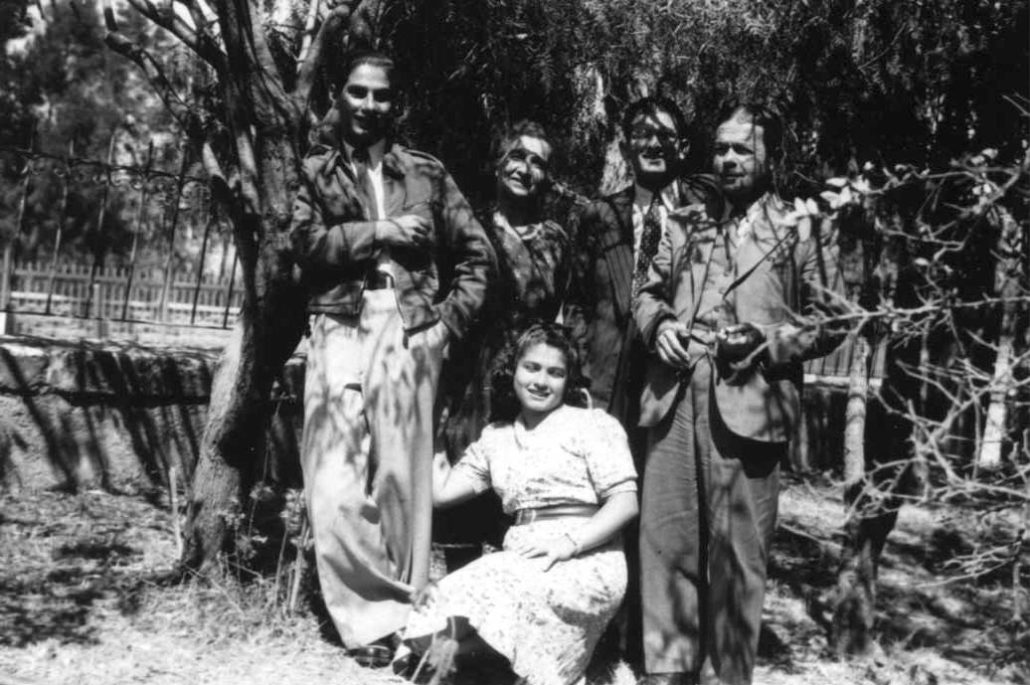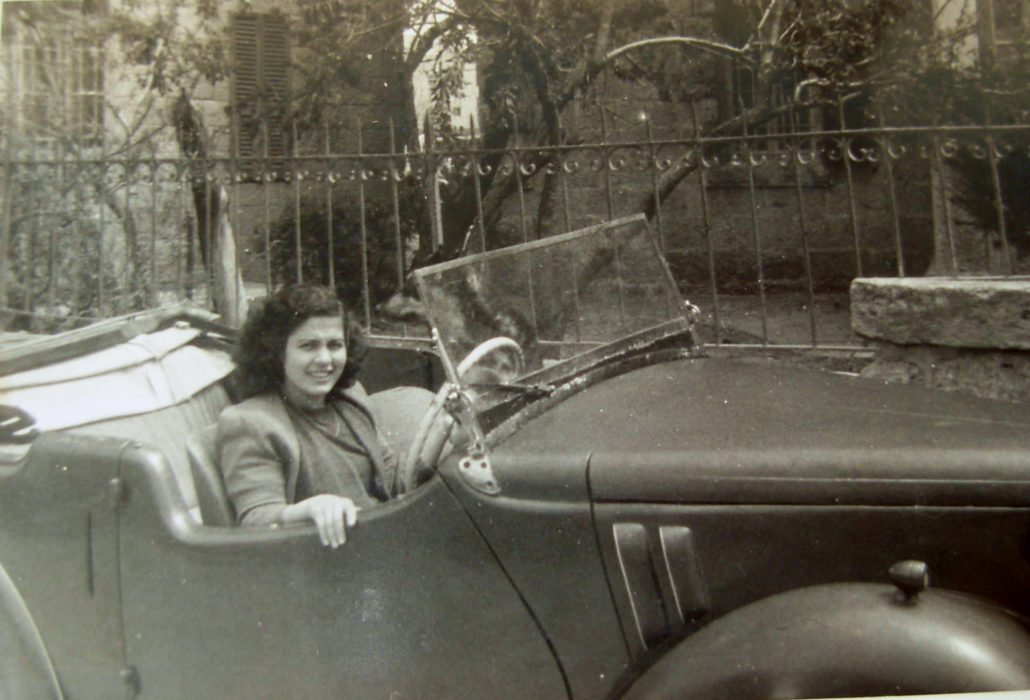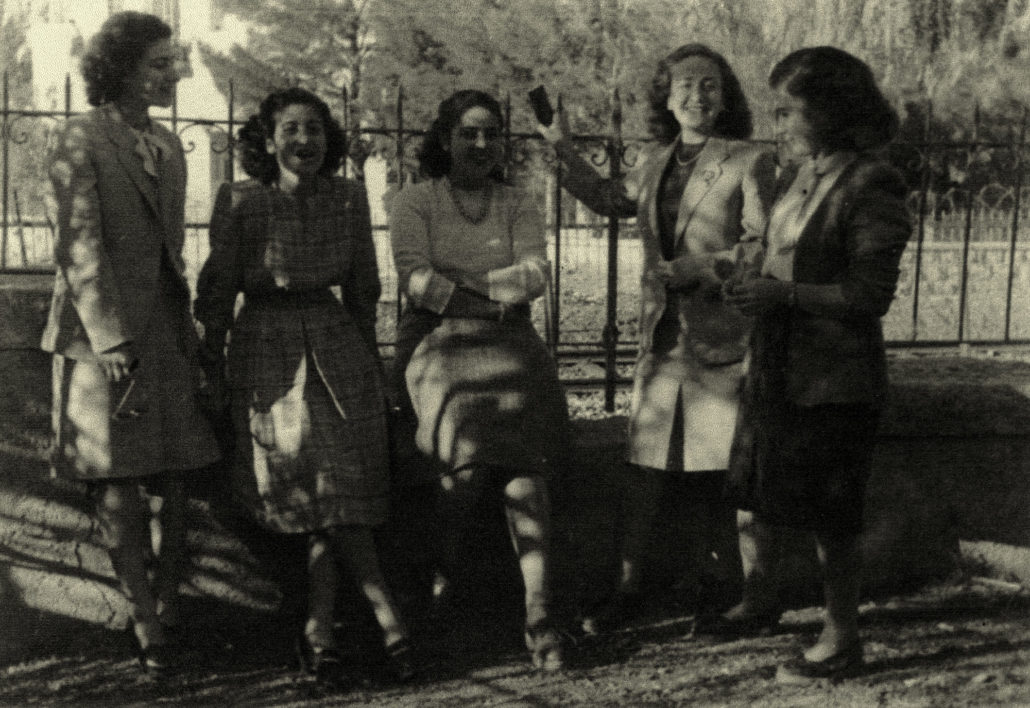Entering My Mother’s House
“Come on, let’s knock at the door,” urged my Israeli friend, Dan*, “it looks like someone’s in the garden.”
I was in Jerusalem working on our interactive documentary, Jerusalem, We Are Here. That day Dan and I were strolling down a public trail, which used to be the original Jaffa–Jerusalem railroad tracks. He had requested that I show him my mother’s house in Lower Baq’a, a West Jerusalem neighborhood.
Then I saw the blue gate and walled-in garden of my mother’s house. I had seen the house from the outside many times before, always with a tightening in my heart. Once I even toured the garden while the current owners were on vacation, thanks to the upstairs neighbor, who had a key to the garden gate.
“But Dan, what if they don’t let us in?” I asked, hesitating about going further, worrying that my request would be turned down, anticipating the same pain of rejection many Palestinians have experienced at the front door of their ancestral homes.
“But Mona, you won’t know unless you try.” And Dan was right.
So he knocked, and a cheerful woman answered the door. Dan rattled off in Hebrew, explaining that my mother had grown up in this house before 1948, and that I was hoping I could visit it. She smiled at me and welcomed me in.
How I wish Mama could have been with me! Ever since I was born she had fed me stories of her childhood home, the house in Lower Baq’a across from the railroad tracks.

in the front of their Lower Baq’a garden, their backs to the railroad tracks, c. 1940
Walking into the house was like stepping inside a piece of my family history. Surprisingly, it made me happy, not angry or sad. The woman led me inside the house I knew by heart. Strange to be led into my family home by the “usurper,” the wrongful owner, but I kept my mouth shut, fearing to be denied entry. The things you allow yourself to do in order to gain something else! It’s a bartering game.
Entering my mother’s house was like rediscovering something I’d lost, but was cherishing in my mind for years and years. I knew the exact layout and where every piece of furniture was placed, because my mother had described it to me in details. It was like meeting a penpal I knew everything about on paper, and finally got to meet in person.
I quickly realized I was holding my breath in fear that at any moment I might be banished unless I were on my best behavior. I felt first-hand the imbalance of power, the victor and the vanquished, the previous and the current, but I held it all in, a polite smile plastered on my face, a racing heart, and jumping beans in my belly. Pinch me somebody! I am in my mother’s house.
I walked through the arched doorway with its wrought-iron portico, and stepped on the exquisite tiled floors decorated with geometric designs. The house built in 1918 is small and simple, but infused with Ottoman architectural details that took me to an ancient kingdom from the Arabian Nights.
Entering my mother’s house was like gently caressing her brow, embracing her and feeling the warmth of her body – that body that had housed me for nine months and had pushed me into the world, that body I knew by heart, my first nourishment, my first vehicle, my first love. Visiting my mother’s childhood home was like entering a sacred place that stored a piece of her, and a piece of my unborn self.
It’s almost as though I didn’t see the current owner of the house. I was looking right through her, past her, to the Palestinian home that housed my mother and her family. It was my mother who was holding my hand and guiding me through the hallway, not the cheery Israeli woman. Mama was at her bedroom window, framed by long burgundy velvet curtains, from which she inhaled the intoxicating scent of jasmine growing in the garden. She was in the back of the house under the khosh-khash tree (bitter oranges), picking oranges to make marmalade. She was sitting at the piano bench practicing the scales under her mother’s watchful eye.

Only once did the tears come when I held the original cold metal key to the front door – a chunky skeleton key, hanging on a hook behind the door. “My mother must have held that key and turned it in the lock many times,” I said. Unlike many Palestinians who locked their front doors and kept the keys to their house, the last person to leave our home was my uncle, Daoud, who was forcibly dragged out into the night, and sent to Atlit, an Israeli forced-labor camp. No one in my family had been able to lock the door. No one had taken the key.
Tears filled up my eyes as I held the key, the closest I felt to my mother’s presence in the house. It was like holding her hand. I wanted that key so desperately. Since the key doesn’t work in the lock anymore, and they keep it as a historical souvenir, I dropped a hint to the current owner that I wish I could make a duplicate. I’ll never know whether she didn’t pick up on my hint, or didn’t want to hear it.
Mama, you were there. I felt you inside those walls, free from the shackles of time. Ah, the foregone moments of joy you must have spent in this house, inhabited now by strangers. I can almost hear the laughter, the teasing, the boisterous banter of three lively children, running down the hallway, the nighttime pillow fights with your brothers, the animated conversations at the dinner table, and, as troubles were mounting and the Nakba was at hand, the frowned brows listening to the radio’s unsettling news. How I grieve for the loss of your home, of Palestine, of you!
(My mother passed away in 2012, three years before I managed to re-enter her house. In 2007 she saw it only from the outside after 59 years of exile.)
* Name changed for privacy protection purposes

From L to R: Salwa Mouchabeck, Aida Mouchabek, Ada Haddad, Mimi Mouchabek, Zakia Jabre.

Hi Mona, This is so well written, I can feel with you. Thanks for posting!
Thank you, Rosemary!
Very well written Mona. Your mother guided you so lovingly through this journey into the past.
Neela
Thank you, Neela. It was a powerful experience, and yes, my mother was with me.
Mona
Your walk through your mothers house evokes a bit of emotion. I have been at your house circa 1946 and treated to the Jabre sugar coated cookies before our adventure to the Regent Cinema with both Zakia and my cousin Aida acting as my care takers. The picture you posted is precious with three of my cousins, Salwa, Mimi and Aida and the all too cheerful Zakia. Childhood memories in our beloved Jerusalem. Thanks Mona for sharing. Much love. Charles
Thank you, Charlie, for sharing your visit to my mother’s house c. 1946. What are the Jabre sugar coated cookies? That’s news to me???
Mona this gives me goosebumps!
Our mothers were very good friends. Unfortunately they were never able to go back to their childhood homes that they left in 1948 thinking they were just leaving for the weekend.
I have heard the stories many times from my mother. Thank you for sharing!
Thank you, Wanda, for your comment. Yes, Mama and your mother shared a similar experience. We are so lucky that they told us about their lives in Jerusalem. I feel as though I have lived all that my mother endured.
Mona,
I have heard you tell this moving story in person, and you brought it alive once again through your beautiful storytelling, the narrative brings me into your journey, the journey of your mother and her family.
Thank-you for this gift of a “window looking in” and your “from the heart” journey. Priceless memories juxtaposition with immeasurable loss…a brave journey Mona.
Thank you, Michelle, for your kind words, and for taking the time to write. It was truly a journey back in time for me, and my mother was my guide.